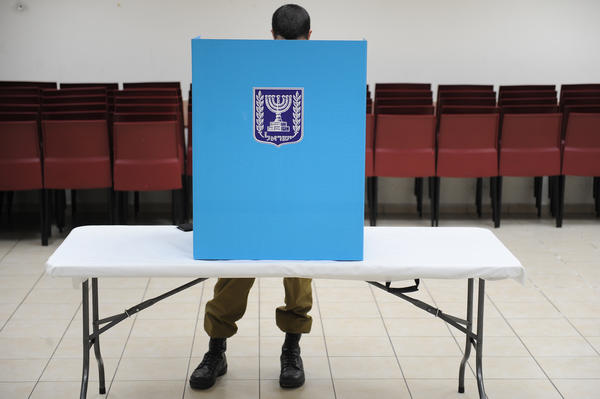
Covering our exclusive Israeli Election Special for The Jewish Weekly is JAMES MARLOW with his report, news briefs and this week’s poll numbers.
REPORT:
Despite several mergers within hours of the close of registration of political factions with the Central Elections Commission last Thursday, a record 47 parties will run for Knesset on 9 April. Lists submitted include the Pirate Party, the Simply Love Party and the new Ki Party led by Rafi Levengrond, the father of murder victim Kim Levengrond Yehezkel. In addition there is The Bible Bloc Party (Gush Hatanachi), which consists of a Jewish-Christian bible group seeking support from Christian Arabs.
Also running is Semion Grafman with his new party called Bitachon Hevrati. Grafman spent a year in a US federal prison for involvement in money laundering and insurance fraud. Ironically, his list of policies include, “fighting corruption.”
Most of these have no prospect of earning enough votes to clear the 3.25% threshold, but Grafman may stand a slightly better chance because he is an internet celebrity and headline grabber. However his choice of letters representing the party on the ballot slip suggests a certain type of character. He will use the Hebrew letters פק, which read in English as f**k. When presenting his registration to Justice Hanan Melcer, who heads the Central Elections Committee, it was reported he said to him, “It’s F**k,” and “It sounds better in English.”
Although 47 parties did submit their registrations before the deadline, several are expected to drop out before the election for a variety of reasons. Achi Yisraeli, the chareidi women’s party, became the first on Tuesday night. In an effort to avoid media attention about the party’s failure, it confirmed by press release at 10.30pm that it will not run.
The Achi Yisraeli statement read: “In light of the political reality that has become apparent in recent days and out of responsibility to the voters, the party’s council decided not to run in the election. Achi Yisraeli will continue to promote its values, especially respectful, unifying discourse on the disagreements in Israeli society.”
However, sources told The Jerusalem Post that the party ran out of money and did not have a budget to produce adverts for the 7 minutes of allocated television time and 14 minutes of radio time. This is the minimum a party that has no Knesset members receives for its political messages.
Founded by Adina Bar-Shalom who is the eldest child of the late Halachic authority and former mentor, Rabbi Ovadia Yosef, Achi Yisraeli promoted an inclusive message that was at odds with that of Shas leader Arye Deri. Her party’s platform permits, public transportation on Shabbat and respect for the LGBT community.
Parties other than Shas did sought Bar-Shalom as a candidate for more than a decade. In the past few weeks, Bar-Shalom received offers to join factions across the political spectrum, but she declined because none offered realistic slots for the other leading figures in Achi Yisraeli.
Her party co-founder, Yeroham mayor Michael Biton left one day before the election was announced to join Benny Gantz and his Israel Resilience Party which is now Blue and White.
Gantz also wanted Bar-Shalom to come on board at the time and she would have been the party’s top female candidate. But sources said that former IDF spokeswoman Ruth Yaron, insisted that Bar-Shalom runs independently and persuaded her not to accept the offers.
There is another party called Achi that is running in the election, together with the Likud. Current deputy defence minister Eli Ben-Dahan is 28th on the Likud list as a representative of Achi, which was founded by former National Religious Party leader Effi Eitam.
In what maybe a first in Israel, Yisrael Beiteinu, Kulanu, Shas, United Torah Judaism, the New Right party led by Naftali Bennett and the United Rightwhich consists of the merger between Jewish Home, National Union and the far right Otzmah Yehudit, have all declared, well in advance, they will recommend Binyamin Netanyahu to form the next government. When the full results are known, the President of Israel meets with the heads of each party asking them who they think should be given the task of forming the next government.
This is likely to create a massive challenge for the new Blue and White party which is leading in all polls, but is unlikely to be successful in putting together a coalition, unless they are willing to join a Likud led government. But Netanyahu is unlikely to dump his traditional alliances with the religious and right parties in favour of possible Shabbat transportation, selective Yeshiva study and secular weddings.
ELECTION NEWS BRIEFS:
ELECTION NEWS 2019
Election analysist JAMES MARLOW compiles this week’s poll numbers based on several pollsters including Midgam Panel, Statnet Institutes, TNS Teleseker, Panels Politics, Direct Polls, Camille Fuchs, Dr Mina Tzemach and Mano Gever. James has made slight adjustments for marginal errors.
The minimum threshold a party must receive is 3.25% which is equivalent to four Knesset seats. If a party receives less, the votes are discarded.
The general election for the twenty-first Knesset is Tuesday 9 April.
Click Link to view poll:
Attachment_1551452153213100001_attach_2_1551452153213100001_Poll Table (by itself) 01-03-19
By James Marlow









